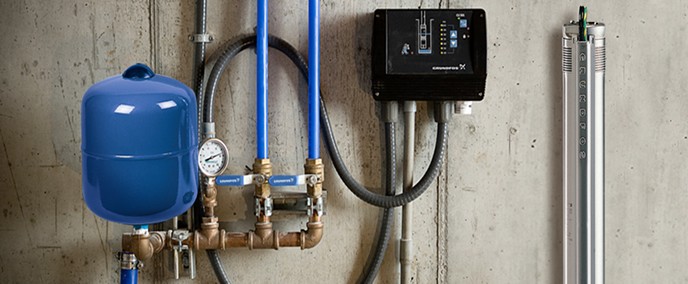Comprehending the Trick Parts of Effective Water Purification Systems

Significance of Water Filtration Equipment
Water filtering systems play a vital function in guaranteeing access to risk-free and clean alcohol consumption water by successfully removing contaminations and impurities. These systems are necessary in attending to the growing problems over water high quality and the potential wellness dangers related to consuming infected water. By making use of different filtering mechanisms such as reverse osmosis, activated carbon, and UV sterilization, water purification systems can efficiently remove hazardous materials like germs, viruses, hefty metals, and chemicals from the supply of water.
Additionally, water filtering systems help to boost the taste and odor of water by eliminating chlorine, debris, and various other contaminants that can influence its quality. Pump repairs & installation. This enhancement in water top quality not only makes it much more tasty but likewise urges individuals to consume an ample amount of water daily, promoting much better hydration and total health
Sorts Of Purification Elements

Physical filters are developed to literally strain out contaminations from the water. These filters can be made from products like ceramic, carbon, and even sand, and they function by trapping bits bigger than the filter's pores as water passes through.
Chemical filters make use of different chemical procedures to remove pollutants from the water. Instances include activated carbon filters, which adsorb pollutants, and turn around osmosis membranes, which utilize stress to separate contaminants from the water.
Biological filters use living microorganisms like algae or germs to damage down raw material and toxins in the water. These filters are typically made use of in wastewater therapy plants or all-natural water filtration systems.
Understanding the different sorts of filtration components is important for choosing one of the most appropriate water purification system for specific purification needs.
Function of Sediment Filters
Sediment filters play a vital duty in water filtration systems by efficiently catching strong fragments put on hold in the water. These filters are commonly the initial line of protection in a purification system, getting rid of bigger fragments such as sand, silt, dust, and corrosion prior to the water relocates through finer recommended you read purification phases. By capturing these sediments, the filters avoid them from reaching downstream components, thus prolonging the life expectancy and performance of the whole system.
Disregarding this maintenance can lead to blocking, reduced water circulation, and compromised filtering performance. In general, debris filters are important parts that contribute substantially to the performance of water filtration systems.
Function of Turned On Carbon Filters
Playing a vital role in water filtration systems, triggered carbon filters contribute in getting rid of impurities and impurities from the water. These filters are developed to adsorb and trap a large range of contaminants, including chlorine, unstable organic substances (VOCs), chemicals, and herbicides. The activated carbon material has a big surface, permitting the efficient trapping of contaminants with a process called adsorption. As water passes with the filter, the turned on carbon holds and attracts onto the impurities, guaranteeing that the water that comes out Get the facts beyond is cleaner and much safer for usage.
Turned on carbon filters are very efficient at improving the preference and odor of water by reducing chemicals that can influence its high quality. Due to their flexibility and integrity, turned on carbon filters are a crucial component in making certain that water is detoxified to the highest possible criteria before reaching consumers.
Recognizing Reverse Osmosis Solutions
Reverse osmosis systems are sophisticated water filtration systems that use an advanced process to get rid of pollutants and impurities from alcohol consumption water. These systems function by using pressure to the water, compeling it through a semi-permeable membrane layer. This membrane works as a barrier, permitting only distilled water molecules to go through, while blocking bigger molecules such as minerals, chemicals, and various other impurities. As an outcome, the water that comes out on the other side is considerably cleaner and safer for usage.
One secret advantage of reverse osmosis systems is their capacity to remove a variety of impurities, including heavy steels, dissolved infections, solids, and microorganisms. This makes them extremely reliable in improving the total top quality and safety of alcohol consumption water. In addition, reverse osmosis Continued systems are reasonably low-maintenance and can be installed under the sink or in a central filtration system, offering practical accessibility to tidy water throughout the home. Generally, recognizing just how reverse osmosis systems function can help individuals make notified choices concerning their water filtration needs.
Conclusion
In verdict, efficient water filtration systems are critical for guaranteeing safe and tidy drinking water. By comprehending the function and duty of each component, individuals can make enlightened choices when choosing a water filtration system.
Water purification systems play an essential role in guaranteeing access to clean and secure drinking water by properly getting rid of contaminations and impurities. By utilizing various filtration systems such as reverse osmosis, triggered carbon, and UV sanitation, water purification systems can effectively remove hazardous substances like bacteria, infections, hefty steels, and chemicals from the water supply.
Debris filters play a vital duty in water purification systems by properly catching solid particles put on hold in the water (Water Filtration Systems).Playing a crucial role in water filtration systems, triggered carbon filters are important in getting rid of pollutants and contaminants from the water supply.Reverse osmosis systems are innovative water purification systems that use an advanced process to get rid of impurities and pollutants from alcohol consumption water